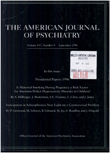Severity of symptoms in chronically institutionalized geriatric schizophrenic patients
Abstract
OBJECTIVE: The goal of this study was to characterize the symptoms of geriatric, chronically ill, institutionalized schizophrenic patients and investigate age-related differences in schizophrenic symptoms and cognitive performance from early adulthood to late senescence. METHOD: The Positive and Negative Syndrome Scale and the Mini-Mental State examination were used to assess the schizophrenic symptoms and cognitive performance, respectively, of 393 institutionalized schizophrenic patients stratified into seven groups designated by 10- year age intervals from 25 years to over 85 years. RESULTS: In the comparisons of the seven age groups, significant differences between groups in positive and negative subscale scores on the Positive and Negative Syndrome Scale and in Mini-Mental State scores were revealed. Significant correlations between Mini-Mental State scores and Positive and Negative Syndrome Scale negative symptom scores, but not positive symptom scores, were found for all age groups, except for the youngest patients studied. Current treatment with neuroleptics and prior treatment with ECT, insulin coma, or leukotomy could not account for the poor cognitive performance of the older schizophrenic patients. CONCLUSIONS: The older schizophrenic patients continued to experience psychotic and nonpsychotic symptoms in senescence. Their positive symptoms were moderately less severe and their negative symptoms and cognitive impairment were significantly more severe than those of the younger patients. Somatic treatment appeared not to be responsible for the severe cognitive impairment and negative symptoms of the older patients. These data are relevant to chronically hospitalized geriatric schizophrenic patients but not necessarily to all geriatric schizophrenic patients.
Access content
To read the fulltext, please use one of the options below to sign in or purchase access.- Personal login
- Institutional Login
- Sign in via OpenAthens
- Register for access
-
Please login/register if you wish to pair your device and check access availability.
Not a subscriber?
PsychiatryOnline subscription options offer access to the DSM-5 library, books, journals, CME, and patient resources. This all-in-one virtual library provides psychiatrists and mental health professionals with key resources for diagnosis, treatment, research, and professional development.
Need more help? PsychiatryOnline Customer Service may be reached by emailing [email protected] or by calling 800-368-5777 (in the U.S.) or 703-907-7322 (outside the U.S.).



